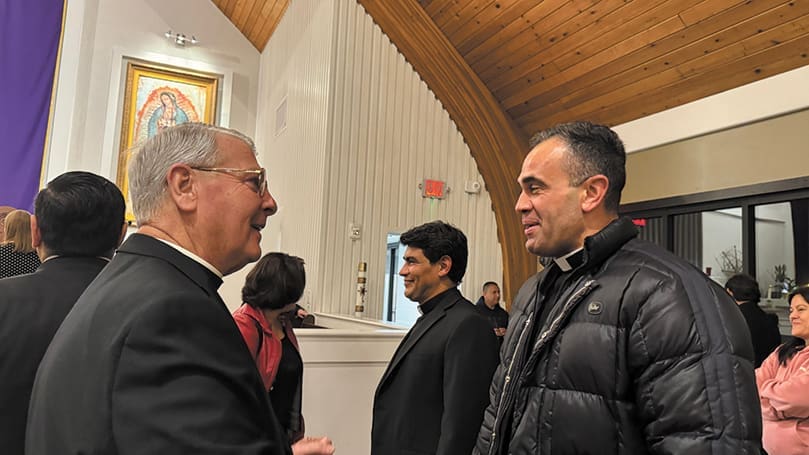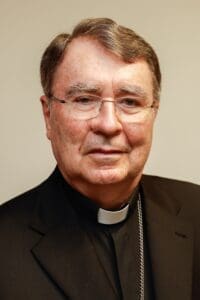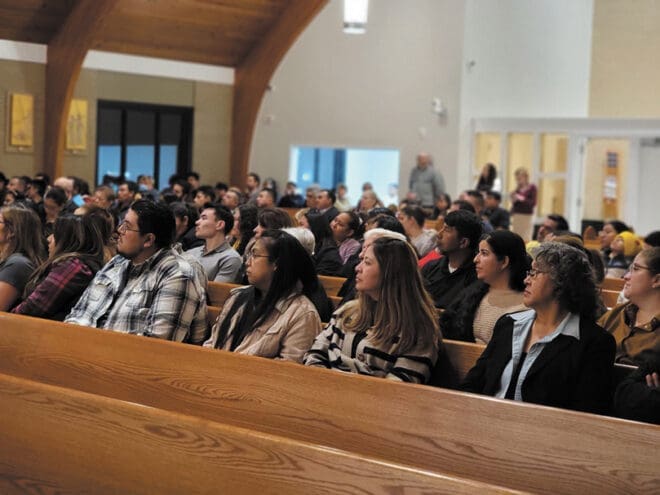 Photo Courtesy of Radio Inmaculada
Photo Courtesy of Radio Inmaculada Brookhaven
Nuncio shares pope’s vision of a listening church at Divine Mercy Mission
By IMELDA RICHÁRD, Special to the Bulletin | Published March 8, 2024 | En Español
BROOKHAVEN—On the evening of Feb. 19, an expectant crowd gathered at Divine Mercy Mission to hear the message of Cardinal Christophe Pierre, apostolic nuncio to the United States, on “The Vision of Pope Francis for a Synodal Church.” The Aquinas Center of Theology at Emory University organized the Spanish-language event.
Established in 2022, Divine Mercy Mission in Brookhaven serves a largely Hispanic community along the Buford Highway corridor.

Cardinal Christophe Pierre. CNS photo/Lola Gomez
“It means a lot to me that our mission was selected to host this important event,” said Father Peeter Pedroza, administrator of the mission. “This was not only an opportunity for our mission to have this apostolic visit, but it also was an opportunity for the entire Hispanic community in our archdiocese to be represented by us.”
Prior to his appointment as nuncio to the U.S., Cardinal Pierre served as apostolic nuncio in Haiti. He also served in this role in Uganda and Mexico.
“Have you heard about a country called Mexico?” he asked in perfect Spanish as the crowd erupted in laughter and applause.
“I hope that by reflecting on some of the main themes that have characterized the pope’s teaching from the beginning of his pontificate until today, you will gain a sense of how you yourselves, in your own corner of the vineyard, can live the pastoral conversion that the Holy Father is calling us to,” said Cardinal Pierre in opening remarks.
This conversion is to a more synodal way of being church, “which is to say, a method of journeying together, listening to each other and to the Spirit, and discerning the paths on which God is calling us to carry the light of the Gospel in today’s world.”
The cardinal said that he expected different levels of understanding and experience regarding what it means to be a synodal church.
“I attended the talk because I wanted to understand what synodality means,” said María José Zavala, a parishioner of Divine Mercy Mission. “I am still not very clear about what it truly means, but I understand now that it has to do with listening to each other with respect and to walk and support each other in this journey of faith.”
Pope Francis calls all to take a closer look at the world today and to recognize changes that have occurred and the impact they have on the way the church transmits the Gospel.
The pope says, “what we are experiencing is not simply an epoch of changes, but a change of epoch,” noted Cardinal Pierre. “In this context the Holy Father quoted Cardinal John Henry Newman, who famously said, ‘Here below, to live is to change, and to be perfect is to have changed often.’”
Cardinal Pierre shared Pope Francis’ words about this change or conversion—“Christian life is a journey, a pilgrimage. The history of the Bible is a journey, marked by constantly new beginnings … the history of God’s people has always been marked by new beginnings, displacements and changes.”
Cardinal Pierre told those gathered they experienced these new beginnings and changes when they came to this country.
“To hear St. John Newman’s quote helped me to better understand Pope Francis’ message about being a synodal church,” said Father Pedroza. “Christ calls us to change many things in ourselves and to begin this process from the inside out. Nowadays it is very challenging to hear Christ’s voice. We need to be able to adapt his message according to all the changes we are seeing in our society without compromising the teachings of our church.”
“Our mission as Christians is always to transmit the Gospel. But unlike a generation or two ago, we find that the Gospel is not being transmitted as automatically as it used to be from one generation to the next. When I was young you were born Catholic, and there was nothing to discuss about it. Nowadays young people tell their parents they don’t want to go to church and parents often wonder what have they done wrong because their children are no longer Catholics,” said Cardinal Pierre.
Dialogue among generations
Citlali Gervacio, 21, said the cardinal’s remarks grabbed her attention.
Gervacio is a college student and serves the mission as a catechist. She is also part of the parish council.
“As a church we need to adapt to the changes we are experiencing as a society in order to get more youth involved and to reach out to those who might not have Christ in their lives,” said Gervacio. “What might have worked 20 years ago is not currently working anymore, and young people are leaving the church because they are not experiencing a personal encounter with Christ—it can be challenging to remain faithful; we all struggle to do so.”

Parishioners and guests listen intently to Cardinal Christophe Pierre’s remarks the evening of Feb. 19 at Brookhaven’s Divine Mercy Mission. Photo Courtesy of Radio Inmaculada
In a conversation with The Georgia Bulletin, Cardinal Pierre acknowledged that the transmission of faith, traditions and values is more difficult today.
“I think it is very important for parents not to give up and to have patience,” he said. “We have to relearn how to transmit our faith and values to children and we need to have a dialogue with them. Don’t be authoritative—teenagers have always been rebellious, but these days they live in a society where nobody helps them understand things, and they pay closer attention to what they hear and see on social media than to their parents.”
Father Leandro Nunes Teixeira, administrator of St. Theresa Church in Douglasville, also attended the program. He is a native of Brazil.
“From the very beginning of his pontificate, Pope Francis is calling us to be a synodal church—a church that goes out, that reaches out to all members, that is merciful,” said Father Teixeira. “In the Synod on Synodality the church is giving everyone the opportunity to be heard.
He explained that the synod starts with listening to people, listening to the Holy Spirit at a diocesan level and goes from there to the bishops’ assembly in Rome, where the bishops listen to each other, and the Holy Father carefully listens to them. The resulting document goes back to parishes to be implemented.
“The church as a loving mother wants to listen to all her children,” said Father Teixeira. “That is the biggest joy of this time.”
The priest said that synodality means to walk together.
“However, we can walk together and not talk to each other. Synodality demands we walk together in harmony just like a symphony orchestra where all members have a chair and are important,” said Father Teixeira.
The nuncio said that listening goes hand-in-hand with openness.
“We must listen, without preconceived judgments, and in a way that is genuine … To listen in this way is the right thing to do because it is the way of our Lord,” he said. “Furthermore, it is the way in which a person feels invited into an encounter with Jesus and his disciples. Every person must know that the church has room for them. The only way they can know this is by being seen and heard, and thus welcomed, by members of the church.”
The cardinal encouraged people to not be afraid to speak up.
“We have to transform our parishes so they can become a place where people can express themselves without fear,” he said.